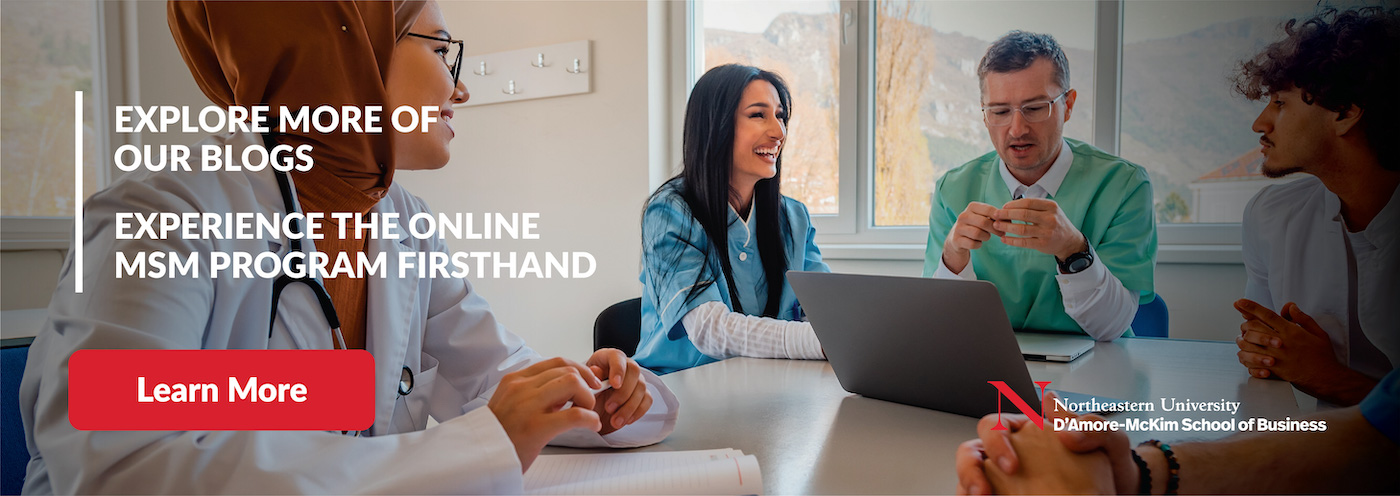Healthcare environments are rapidly evolving. Due to changing patient needs, medical advancements, and greater use of data and technology, there’s been a shift in what facilities expect out of their employees.
For example, advanced education has become vital for healthcare professionals to stay proficient amidst the digital transformation in healthcare. That’s why so many healthcare professionals are earning a degree in healthcare management.
Whether you’re interested in healthcare administration, policymaking, or information systems, here’s a closer look at what you can expect from a master’s degree in healthcare management at Northeastern.
Ready to apply? Request an application fee waiver
What Is Healthcare Management?
While direct-care providers who work one-on-one with patients are often the “face” of healthcare systems, there are several decision-makers behind the scenes who keep the facilities running. These are often MDs assuming practice management responsibilities—but just as often not.
“Healthcare management is both managing current operations and innovating on those operations to improve medical outcomes,” says Marc Meyer, Professor of Entrepreneurship at Northeastern’s D’Amore-McKim College of Business and Faculty Director of the program.
Some examples of these operations include:
- Hiring qualified staff
- Overseeing facility finances
- Allocating resources
- Organizing health data
In many ways, healthcare management is the coordination of processes, people, and resources involved in the delivery of healthcare services.
Northeastern’s students come from a variety of career backgrounds in clinical care management and quality assurance, including nursing managers and administrative staff that manage patient intake, inpatient flow, and discharge. There are also students who represent the multitude of administrators that manage personnel, IT, facilities, and marketing for healthcare enterprises. In large organizations, these roles manage substantial research operations or pathology and other types of lab services.
“This shows how vast and complex healthcare delivery really is. is, with an incredible range of roles to manage different aspects of that delivery,” Meyer says.
What Is a Master’s Degree in Healthcare Management?
For those interested in the operations of healthcare facilities there are several non-clinical career paths that can make an impact on patient outcomes.
A master’s in healthcare management is an advanced degree designed to equip students with the comprehensive skills and knowledge needed to lead and manage healthcare organizations effectively.
It covers a broad range of core topics, including:
- Healthcare finance
- Healthcare ethics
- Enterprise competitive strategy
- Healthcare supply chain management
- Data analytics and quality measurement
- Operations management and services innovation in healthcare
- Healthcare economics and policy
Northeastern’s Online MS in Management programs touch on all of these topics, preparing students to handle the business side of healthcare operations in various industries, such as hospitals, clinics, government agencies, and other healthcare settings.
The two programs Northeastern offers include:
- Digital Transformation in Healthcare: Focuses on the role of data analytics, clinical decision support systems, data management, and machine learning to improve the quality of care. A major part of each course is applying course methods to personal projects at real organizations, like medical device manufacturers, medical software companies, or government agencies.
- Healthcare Administration: Provides a more comprehensive education on the “people side” of healthcare, including leadership, multifunctional team management, negotiations, workforce planning, and DEI enablement.
No matter what degree students choose, they can take electives from the other track in their own course of study. Our goal is to empower individuals to make a meaningful impact on patients, their organizations, and their career. The courses provide a blend of technical, managerial, and healthcare-specific knowledge that enables graduates to innovate, streamline, and enhance the healthcare delivery and management system.
6 Benefits of Earning a Master’s in Healthcare Management at Northeastern Online
If you’re concerned about the time commitment of a master’s degree program, earning an online master’s degree might be the right option for you. Here are six benefits of earning an online healthcare management degree at Northeastern.
1. Flexibility
Online education has emerged as a popular route for professionals who want to further their education without disrupting their careers. In fact, online institutions enroll nearly 15 percent of U.S postsecondary students—or 2.79 million learners according to Forbes.
Online master’s programs—like the ones offered at Northeastern—provide a flexible and accessible way for individuals to enhance their skills and knowledge with asynchronous courses and optional, but highly encouraged, live faculty connect sessions.
“You’re not going to have to take four years off and get a degree in data science or something,” Meyer says. “Instead you’ll take some short, powerful courses that get you up to speed on healthcare today and give you the space to then apply it.”
2. Career Advancement
Earning an advanced education can empower both healthcare and non-clinical professionals to overcome the gaps in their understanding of the business side of the industry. This is often the key barrier preventing them from achieving leadership positions.
“Many people in the healthcare industry didn’t go to business school,” says Meyer. “So one reason to get this advanced degree is to learn that aspect of healthcare that can get you a seat at the table.”
Northeastern’s online master’s degree in healthcare management programs are designed to cultivate leadership and strategic planning skills, crucial for career advancement in today’s complex healthcare system. By equipping students with these competencies, the programs prepare them to navigate today’s top challenges in the healthcare sector.
3. Faculty Expertise
Relocating for grad school isn’t a viable option for everyone. However, Northeastern’s online degree programs make it possible for any professional to learn from industry leaders at the D’Amore-McKim School of Business and Mayo Clinic College of Medicine and Science.
For instance, Dr. John Halamka, Northeastern’s faculty co-director and president of the Mayo Clinic platform, previously served as Beth Israel Deaconess Medical Center’s chief information officer. He has advised on healthcare information strategies for the Bush and Obama administrations and helped shape the Biden administration’s AI healthcare policy.
Learning from experienced professionals like Dr. Halamka offers students unparalleled insights into the industry. And, ultimately, this engagement with industry leaders provides valuable perspectives that can prepare them for a successful career in healthcare management.
4. Experiential Learning
Healthcare professionals who want to become leaders need to grow and reinforce their skills by practicing, not just studying theories or watching others. Northeastern’s degree programs engage students through experiential learning to strengthen critical thinking and decision-making skills.
Past students at Northeastern’ have worked on various projects through this model that gave them the space to explore their passions, such as:
- Overseeing a mini clinic in Vietnam
- Improving mental health treatment in young children
- Managing medication safety in hospitals
This hands-on approach enables students to apply their knowledge in real-time, enhancing their ability to evaluate problems and improve the solutions they develop.
5. Network Opportunities
Networking is a key advantage of pursuing a graduate education. In this setting, learners collaborate with goal-oriented professionals who are passionate about their work and bring a wealth of diverse experience.
Northeastern’s expansive network of 50,000 D’Amore-McKim School of Business alumni, students engage in rich exchanges with peers, faculty, and industry leaders through discussion groups and roundtables, enhancing their management skills and competitive edge in the industry.
“You’re gonna meet a bunch of teachers who are working in prestigious organizations, not just at Northeastern, but the Mayo Clinic and elsewhere,” Meyer says. “And then you’re gonna be surrounded by other mid-career professionals who will be very important sounding boards as you move forward in your career.”
6. Specialized Field of Study
Specialization is the key to developing expert skills that prepare you to take on challenging roles. Northeastern’s two specializations offer cutting-edge curriculum that reflects the latest trends and advancements, and the courses are continually updated to ensure graduates learn the most relevant information.
The Digital Transformation in Healthcare teaches managers, direct care providers, and transitioning professionals how to leverage data and technology to improve the efficiency and quality of healthcare services.
“We start with core innovation principles and methods from across industry,” Meyer says.”Then, we dig into healthcare specific applications.”
The program explores topics like:
- Genomics
- Telemedicine
- Data security,
- Mobile and remote health applications
At the same time, the curriculum addresses the risk factors of data-driven decision-making and the importance of reducing bias in generative AI solutions.
The Healthcare Administration is tailored to mid-career healthcare professionals and people transitioning from other fields. The program equips graduates to master the core responsibilities of operations management across patient services, quality management, and connectivity for healthcare. It also helps students develop skills in negotiation, workforce planning, and DEI management.
Start Your Future Career in Healthcare Management
Starting a career in healthcare management with a master’s degree isn’t just about securing a certain role, it’s also about setting a solid foundation for long-term professional advancement and success.
“Don’t think about your next job,” Meyer says. “Think about the next job after and how education fits into your longer-term career path.”
By choosing Northeastern’s graduate degrees in healthcare management, you’re not only deepening your understanding of essential leadership principles but also engaging in an educational experience that combines experiential learning with an innovative curriculum that can take your career to the next level.
For details on the Online MS in Management programs, contact an admissions counselor to see how they match your goals.





